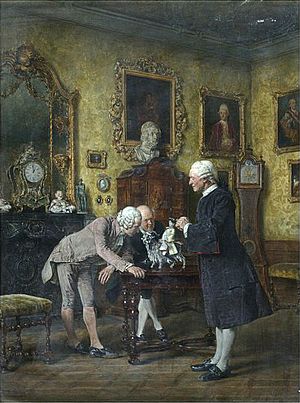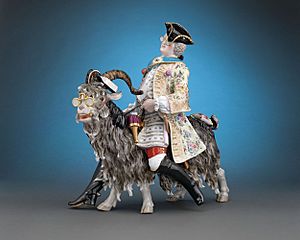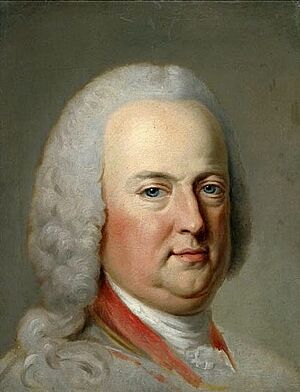Heinrich von Brühl facts for kids
Quick facts for kids
Count
Heinrich von Brühl |
|
|---|---|
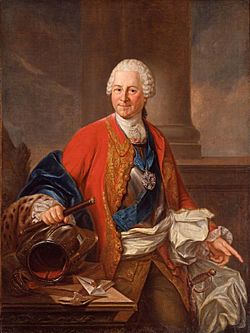
Heinrich von Brühl in a Polish costume by Bacciarelli
|
|
| Born |
Heinrich von Brühl
13 August 1700 Gangloffsömmern
|
| Died | 28 October 1763 (aged 63) |
| Nationality | Saxon, Polish |
| Occupation | Diplomat, statesman at the court of Saxony and the Polish–Lithuanian Commonwealth |
| Spouse(s) | Countess Franziska von Kolowrat-Krakowska |
| Parent(s) | Johann Moritz von Brühl |
Heinrich, Count von Brühl (Polish: Henryk Brühl, August 13, 1700 – October 28, 1763) was an important statesman in Saxony and the Polish-Lithuanian Commonwealth. He was a member of the powerful German von Brühl family.
Brühl was a very skilled diplomat and clever planner. He managed to gain a lot of control over both Saxony and Poland. He even controlled access to the king, Augustus III, meaning people often had to go through Brühl to reach the king.
A Polish writer, Józef Ignacy Kraszewski, wrote a novel called Count Brühl. In the book, Heinrich is shown as a demanding and determined leader. He tried to gain control of the whole country.
It is said that Brühl owned Europe's largest collection of watches and military vests. He also had many ceremonial wigs and hats. His collection of Meissen porcelain was the biggest in the world. He also had one of the largest collections of Kabbalah books in Europe.
Contents
Early Life and Rise to Power
Heinrich von Brühl was born in Gangloffsömmern. His father, Johann Moritz von Brühl, was a nobleman who worked for the court of Saxe-Weissenfels. Sadly, his father lost the family estate.
Young Brühl started working as a page for the duchess of Saxe-Weissenfels. In 1719, he moved to the court of Saxony in Dresden. He quickly became a favorite of the Elector, Frederick Augustus I. This ruler was also the King of Poland.
Brühl was very good at finding money for his king, who spent a lot. By 1731, Brühl became the Chief Receiver of Taxes and Minister of the Interior for Saxony. This meant he was in charge of collecting money and managing the country's internal affairs.
When King Augustus II died in 1733, Brühl was in Warsaw. He quickly gained the trust of the new Elector, Frederick Augustus II. Brühl made sure the new king received his father's important papers and jewels right away. Brühl also helped raise money to make Frederick Augustus II the new King of Poland. He became King Augustus III.
Brühl's Influence and Lifestyle
For most of King Augustus III's reign, Brühl was the king's main advisor. He was like the unofficial head of the Saxon court. In 1737, he became a Count. After 1738, he was basically the only minister in charge.
In 1746, the special title of Prime Minister was created just for him. Brühl was a "court favorite," meaning he had a lot of power because the king liked him so much. He gained many titles and earned a lot of money from all his different jobs. He also worked closely with Bishop Kajetan Sołtyk.
Brühl was very clever at controlling the king and getting rid of anyone who might challenge his power. No one could get a job with the king without Brühl's approval. Even when the king went to church, Brühl made sure no one could talk to him without permission.
The king often asked Brühl, "Brühl, do I have any money?" Brühl would always say, "Yes, sire." To keep the king happy, Brühl spent a lot of state money. This caused the country to go into debt and made the army much smaller.
Brühl lived a very fancy life. He had 200 servants, and his guards were paid more than the king's own guards. His meals were also more luxurious than the king's. Frederick II once joked that Brühl had more clothes, watches, and shoes than anyone else!
Politics and Challenges
Brühl was a good diplomat. He played a key role in the "Diplomatic Revolution" of 1756. This was when countries like Austria and France changed their alliances.
However, Brühl was also responsible for some big problems. His money policies were very bad for Saxony. They made Saxony much weaker between 1733 and 1763. He also encouraged King Augustus III to try and become King of Poland. This led to a civil war and hurt Poland's independence.
Brühl's decisions also led Saxony into alliances that caused the Seven Years' War. This war was very damaging for Saxony. The country was not ready for war. At the start of the war, the Saxon army had only 17,000 soldiers. They had to surrender quickly because they didn't have enough supplies. Saxony became a battlefield.
Brühl was not good at military matters or keeping secrets. His carelessness often helped the King of Prussia learn about plans against him. But King Augustus III always trusted Brühl, even when they had to flee during the war. They took their paintings and china, but left important state documents behind.
Brühl took advantage of the king's trust. Besides his huge salary, an investigation later found that he had taken millions of talers (money) for himself. He often left important government work to his servants without checking on them.
Brühl's Legacy
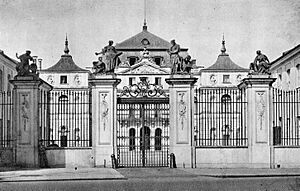
Brühl died in Dresden on October 28, 1763, just a few weeks after his king. The new Elector, Frederick Christian, ordered an investigation into Brühl's finances.
Brühl's wealth, which included large palaces, was worth a lot of money. His family later got it back. The investigation showed that he became rich mostly because the king was so generous, not because he did anything illegal.
Brühl's love for luxury also helped the arts and sciences. The famous Meissen porcelain Swan Service, with over 2,200 pieces, was made for him. In 1736, he started building a city palace and terrace in Dresden, now known as Brühl's Terrace. The Brühl Palace in Warsaw was also rebuilt for him.
Brühl was a dedicated collector and supporter of the arts. He owned a large art gallery, which was later bought by Empress Catherine II of Russia. His library had 70,000 books, making it one of the biggest private libraries in the Holy Roman Empire.
Family Life
Heinrich von Brühl married Countess Franziska von Kolowrat-Krakowska in 1734. She came from a powerful noble family in Bohemia and was a favorite of the king's wife. They had four sons and one daughter who lived to adulthood.
His oldest son, Alois Friedrich von Brühl, also became a politician and soldier. His daughter, Maria Amalia, married a Polish count. His youngest son, Hans Moritz von Brühl, was a military officer and later worked on roads.
Heinrich von Brühl also had a nephew named Hans Moritz von Brühl, who was a diplomat and astronomer. He spent much of his life in England.
See also
 In Spanish: Heinrich von Brühl para niños
In Spanish: Heinrich von Brühl para niños
- Nicholas Repnin
- Count Wenzel Anton Kaunitz-Rietberg
- Brühl (disambiguation)
Images for kids
-
Count Brühl's Goat by Carl Seiler depicting Brühl showing off his extravagant Meissen porcelain. Victoria and Albert Museum
-
Heinrich von Brühl by Marcello Bacciarelli (1758-1763), National Museum in Warsaw
-
Brühl Palace in Warsaw, one of the largest palaces and one of the finest examples of rococo architecture in pre-war Poland
 | Toni Morrison |
 | Barack Obama |
 | Martin Luther King Jr. |
 | Ralph Bunche |


